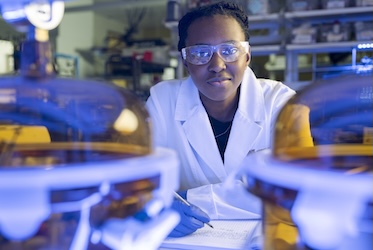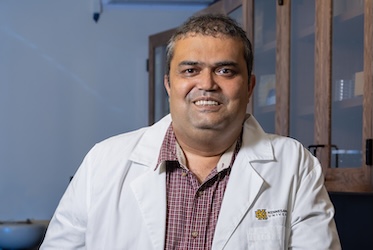
KSU researcher awarded NIH grant for project on gestational diabetes risk
KENNESAW, Ga. | Sep 21, 2020
Gestational diabetes affects nearly one in 10 pregnancies and is associated with children facing an increased risk of obesity and diabetes as adults. Kennesaw State University researcher Katherine Ingram is tackling these transgenerational health issues through a grant from the National Institutes of Health (NIH).
Ingram, associate professor of exercise science in KSU’s Wellstar College of Health and Human Services, is the principal investigator for the $406,000 grant awarded by the Eunice Kennedy Shriver National Institute of Child Health and Human Development (NICHD).

The project’s primary focus is to determine the independent and interactive relationships between abdominal fat, fitness and inactivity during pregnancy to identity the influence of each factor on gestational diabetes risk. With several connections with Atlanta-area obstetrics clinics, Ingram and her team will recruit research participants from the clinics’ patient populations as well as via social media.
“Obesity, especially abdominal obesity, in pregnant women is a strong risk factor for gestational diabetes with research showing that exercise is protective.” said Ingram. “However, it is unknown how much each of these factors contribute to risk. This study focuses on the novel use of abdominal fat, fitness, and inactivity measures as early risk predictors.”
Data, including the novel use of ultrasound measures of abdominal fat, will be collected during the period of early pregnancy (12-15 weeks) to post-partum (4 weeks). The research will be conducted within the Physiology Laboratory and the Biomarkers Laboratory, both located on the Kennesaw campus in the Wellstar College of Health and Human Services.
“The purpose for my work as a scientist is to eradicate transgenerational obesity by resolving gaps in knowledge that will lead to the development of effective lifestyle interventions,” Ingram said. “The NIH study is a culmination of my previous research on maternal metabolic health that has been funded by KSU internal grants.”
Ingram’s interdisciplinary team for the three-year study includes KSU co-investigators Janeen Amason, associate professor of nursing; Brian Klizszewicz, associate professor of exercise science; and Nicole Ferguson, associate professor of statistics. KSU graduate and undergraduate research assistants will assist in all aspects of the research from project development to data collection and analysis.
The work of the Ingram lab was recently highlighted during the inaugural spring season of the web series, “Research with Relevance: Friday Features,” produced by KSU’s Office of Research. Ingram and Amason, who regularly collaborate, discussed their research and fielded questions from KSU and community virtual attendees.
“The overall goal of our program is to identify high-risk women much earlier in pregnancy and to improve the diet and exercise programs that they are prescribed,” said Ingram. “We believe that these steps are needed to improve care for women struggling with obesity and to mitigate the effects of obesity during pregnancy on the child.”
– Joëlle Walls
Photos by David Caselli
Related Stories

Kennesaw State students to present research at Symposium of Student Scholars

Chemistry student engaged in sustainable catalyst research through Kennesaw State's First-Year Scholars program

Kennesaw State researchers awarded Department of Energy grant to investigate materials that boost energy-efficient technologies

Kennesaw State student leverages Double Owl Pathways program to accelerate career path
A leader in innovative teaching and learning, Kennesaw State University offers undergraduate, graduate, and doctoral degrees to its more than 47,000 students. Kennesaw State is a member of the University System of Georgia with 11 academic colleges. The university’s vibrant campus culture, diverse population, strong global ties, and entrepreneurial spirit draw students from throughout the country and the world. Kennesaw State is a Carnegie-designated doctoral research institution (R2), placing it among an elite group of only 8 percent of U.S. colleges and universities with an R1 or R2 status. For more information, visit kennesaw.edu.















